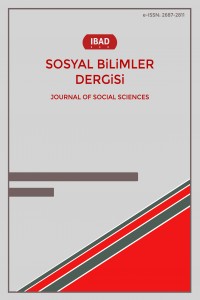Öz
Bu çalışmada öznel ve nesnel olasılıklar
arasındaki işbirliği koşulları incelenmektedir. Burada işbirliği sözcüğü ile
anlatılmak istenen, olasılıklardan biri belli iken öbürünü de belli etmektir. Olasılık
kuramının ilk zamanlarında böyle bir sorun yoktur; çünkü o zamanlarda tek
olasılık vardır, o aynı anda hem öznel hem de nesnel olasılıktır, büyük sayılar
yasası onlardan birinin öbürüne eşit olmasını garanti etmektedir, bu da
demektir ki olasılıklardan biri belli iken öbürü de bellidir. O günlerdeki işbirliğine
mutlak işbirliği denebilir. Bugün yalnızca koşullu işbirliği kabul edilebilir
niteliktedir. Bu çalışma söz konusu koşullu işbirliğini incelemeyi
amaçlamaktadır.
Anahtar Kelimeler
Kaynakça
- Arntzenius, F ve Hall, N. (2003). On What We Know About Chance. British Journal of Philosophical Science, 54 (2), 171-179.Carnap, R. (1945a). The Two Concepts of Probability. Philosophy and Phenomenological Research, 5 (4), 513-532.Carnap, R. (1945b). On Inductive Logic. Philosophy of Science, 12 (2).72-97.Cooper, Neil (1965). The Concept of Probability. The British Journal for the Philosophy of Science, 16 (63), 226-238.Daston, L. (1994). How Probabilities Came to Be Objective and Subjective, Historia Mathematica, 21, 330-344.Gillies, D. (2000). Philosophical Theories of Probability, Routledge: London and New York.Gnedenko, B. V. (1978). The Theory of Probability (Translated from George Yankovsky). Mir Publishers: Moscow.Gorroochurn, P. (2011). Errors of Probability in Historical Context. The American Statistician, 65 (4), 246-254.Hacking, I. (1991). The Emergence of Probability, Cambridge University Press: Cambridge.Hempel, C. G. (1965). Aspects of Scientific Explanation and Other Essays in the Philosophy of Science. Toronto: Collier-Macmillan.Herakleitos (2005). Fragmanlar (Çeviren Cengiz Çakmak). İstanbul: Kabalcı Yayınevi.Lewis, D. (1980). A Subjectivist’s Guide to Objective Chance (Studies in Inductive Logic and Probability II içinde (Editor R. C. Jeffrey), University of California Press: Berkeley), 263-293.Miller, I ve Miller, M. (2014). John E. Freund's Mathematical Statistics with Applications. Edinburgh: Pearson Education Limited.Mittelstaedt, P. ve Weingartner, P. A. (2005). Laws of Nature. Berlin: Springer-Verlag.Namık Kemal (2004). Vatan yahut Silistre & Zavallı Çocuk (Yayına Hazırlayan Cengiz Yurt). Klas Yayınları: İstanbul.Strevens, M. (1995). A Closer Look at the New Principle. The British Journal for the Philosophy of Science, 46, 545-561.Strevens, M. (1999). Objective Probability as a Guide to the World, Philosophical Studies, 95, 243-275.Thau, M. (1994). Undermining and Admissibility. Mind, 103, 491-505.
Öz
This study examines the conditions of cooperation between
subjective and objective possibilities. Here, the intended goal to express the
word of collaboration is to make one probability known when the other is known.
There was no such problem in the early days of probability theory; because
there is only one possibility at that time, it is both subjective and objective
at the same time, the law of large numbers guarantees that one of them is equal
to the other, which means that while one
of the probabilities is certain, the other is obvious too. Cooperation in those
days can be called absolute cooperation. Today, only conditional cooperation is
acceptable. This study aims to examine this conditional cooperation.
Anahtar Kelimeler
Probability Subjective Probability Objective Probability Cooperation
Kaynakça
- Arntzenius, F ve Hall, N. (2003). On What We Know About Chance. British Journal of Philosophical Science, 54 (2), 171-179.Carnap, R. (1945a). The Two Concepts of Probability. Philosophy and Phenomenological Research, 5 (4), 513-532.Carnap, R. (1945b). On Inductive Logic. Philosophy of Science, 12 (2).72-97.Cooper, Neil (1965). The Concept of Probability. The British Journal for the Philosophy of Science, 16 (63), 226-238.Daston, L. (1994). How Probabilities Came to Be Objective and Subjective, Historia Mathematica, 21, 330-344.Gillies, D. (2000). Philosophical Theories of Probability, Routledge: London and New York.Gnedenko, B. V. (1978). The Theory of Probability (Translated from George Yankovsky). Mir Publishers: Moscow.Gorroochurn, P. (2011). Errors of Probability in Historical Context. The American Statistician, 65 (4), 246-254.Hacking, I. (1991). The Emergence of Probability, Cambridge University Press: Cambridge.Hempel, C. G. (1965). Aspects of Scientific Explanation and Other Essays in the Philosophy of Science. Toronto: Collier-Macmillan.Herakleitos (2005). Fragmanlar (Çeviren Cengiz Çakmak). İstanbul: Kabalcı Yayınevi.Lewis, D. (1980). A Subjectivist’s Guide to Objective Chance (Studies in Inductive Logic and Probability II içinde (Editor R. C. Jeffrey), University of California Press: Berkeley), 263-293.Miller, I ve Miller, M. (2014). John E. Freund's Mathematical Statistics with Applications. Edinburgh: Pearson Education Limited.Mittelstaedt, P. ve Weingartner, P. A. (2005). Laws of Nature. Berlin: Springer-Verlag.Namık Kemal (2004). Vatan yahut Silistre & Zavallı Çocuk (Yayına Hazırlayan Cengiz Yurt). Klas Yayınları: İstanbul.Strevens, M. (1995). A Closer Look at the New Principle. The British Journal for the Philosophy of Science, 46, 545-561.Strevens, M. (1999). Objective Probability as a Guide to the World, Philosophical Studies, 95, 243-275.Thau, M. (1994). Undermining and Admissibility. Mind, 103, 491-505.
Ayrıntılar
| Birincil Dil | Türkçe |
|---|---|
| Bölüm | Araştırma Makaleleri |
| Yazarlar | |
| Yayımlanma Tarihi | 30 Ekim 2019 |
| Kabul Tarihi | 3 Eylül 2019 |
| Yayımlandığı Sayı | Yıl 2019 Ekim 2019 Özel Sayısı |
Etik İlkeler ve Yayın Politikası |
This journal is subscribes to the principles of the Committee on Publication Ethics. |
IBAD Sosyal Bilimler Dergisi I (online) ISSN 2687-2811

